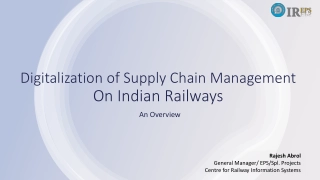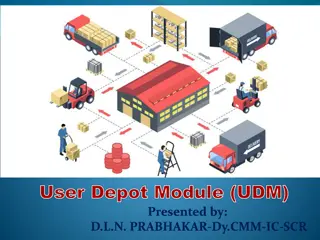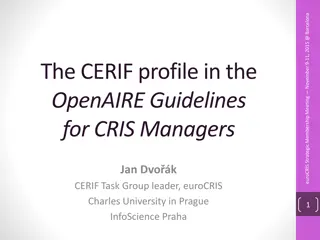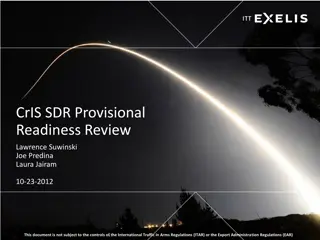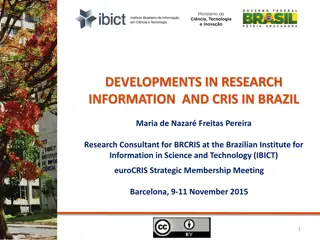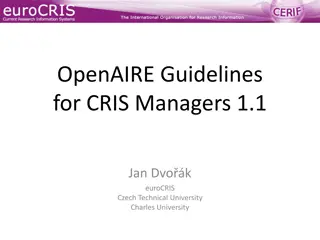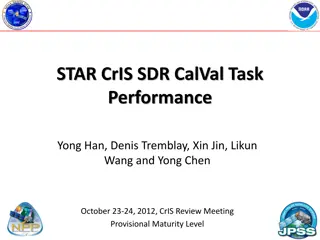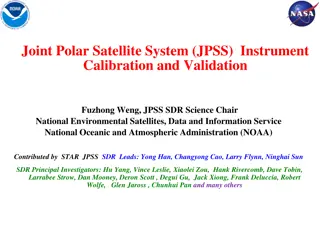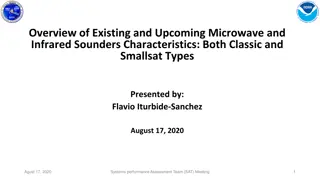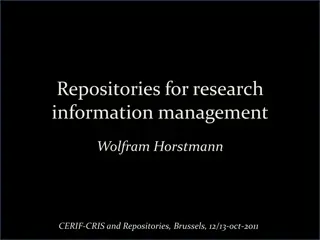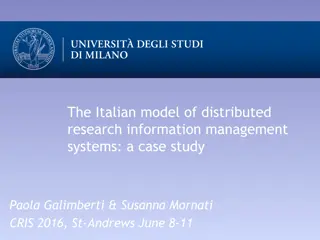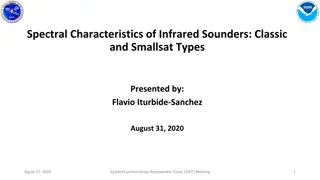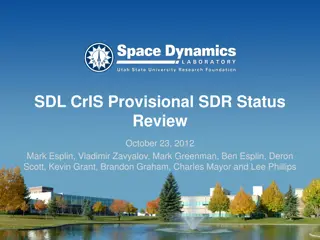Digitalization of Supply Chain Management On Indian Railways
An overview of the digitalization of supply chain management on Indian Railways, including the role of CRIS and the IREPS portal, offering e-tendering, e-reverse auction, procurement of goods and services, and more. Explore the progress made over the years and the salient features of the digital sys
4 views • 23 slides
Understanding User Depot Module (UDM) in Material Management
Genesis UDM was developed by CRIS to computerize material management at consignees' end, integrating with iMMS and IREPS. UDM revolutionizes the supply chain of materials management through digitalization, optimizing asset maintenance, expenditure control, and promoting a shift to digital working en
0 views • 19 slides
Insights from euroCRIS Strategic Membership Meeting in Barcelona, 2015
Explore the discussions and guidelines presented at the euroCRIS meeting, focusing on CERIF profiles, OpenAIRE Guidelines for CRIS Managers, research outputs, infrastructure, and the use of CERIF entities. Key topics include CERIF profiles in research information interchange, OpenAIRE infrastructure
1 views • 13 slides
Exelis Engineering Support for CrIS Post-Launch Operations
Exelis played a key role in providing support for the CrIS satellite instrument post-launch operations. The support included activities such as early orbit instrument checkout, calibration table uploads, and developing new algorithms for better data processing. Exelis also assisted in updating Engin
0 views • 56 slides
Developments in Research Information and CRIS in Brazil: Insights from Maria de Nazar Pereira
Explore the latest advances in research information and Current Research Information Systems (CRIS) in Brazil through the perspective of Maria de Nazar Pereira, a Research Consultant at the Brazilian Institute for Information in Science and Technology (IBICT). The presentation covers an overview of
0 views • 55 slides
Guidelines for CRIS Managers in Research Institutions
These guidelines provide valuable insights for CRIS Managers in research institutions, covering metadata interchange formats, publication types, and affiliations. The document suggests improvements for a more streamlined approach to information sharing, with a focus on enhancing API compatibility an
0 views • 10 slides
Performance Review of STAR's CrIS SDR Calibration and Validation Task
This document provides an overview of the performance review conducted on the CrIS SDR Calibration and Validation Task at the STAR Review Meeting in October 2012. Tasks include managerial and technical leadership, trending and monitoring of instrument data quality, inter-sensor comparisons, measurem
0 views • 24 slides
Advanced Satellite Systems for Environmental Monitoring
The Joint Polar Satellite System (JPSS) utilizes advanced instruments like ATMS, CrIS, VIIRS, OMPS, and CERES to provide crucial data for weather forecasting, ozone monitoring, and Earth radiation studies. The Suomi NPP and JPSS-1 instruments offer high-resolution temperature, water vapor, and image
0 views • 30 slides
Advancements in Microwave and Infrared Sounders for Weather Forecasting
Microwave and Infrared sounders play a crucial role in weather forecasting by providing valuable data for atmospheric studies and climate research. The existing generation of sounders like ATMS, CrIS, and AIRS has been successful, but new advancements in smallsat technology aim to enhance temporal r
0 views • 7 slides
Challenges and Opportunities in Research Information Management
Understanding the need for interoperability between Research Information Systems (CRIS) and Open Access Repositories (OAR) can enhance efficiency and quality of services for researchers. Collaboration is key to avoiding redundancies and maximizing the benefits for all stakeholders involved. Emphasiz
0 views • 21 slides
Italian Model of Distributed Research Information Management Systems
The case study discusses the adoption of Dspace-CRIS in Italy, highlighting the benefits such as open repositories, enhanced metadata quality, and increased national research visibility. The integration of persistent identifiers like ORCID has improved data quality and interoperability. Lessons lear
0 views • 17 slides
Spectral Characteristics of Infrared Sounders: Overview and Comparison
This presentation discusses the spectral characteristics of classic and smallsat types of infrared sounders, focusing on key parameters of LEO hyperspectral IR sounder sensors, spectral coverage, resolution, sampling, as well as the impact of spectral bands on power consumption and volume in smallsa
0 views • 4 slides
Satellite Data Review and Calibration Analysis
Review of the SDL.CrIS provisional SDR status, completion of various CrIS cal/val tasks, and detailed assessments of different bit-trim masks for satellite interferometer optimization, with findings on bit-trim errors, interference analysis, and mask adjustments.
0 views • 44 slides
